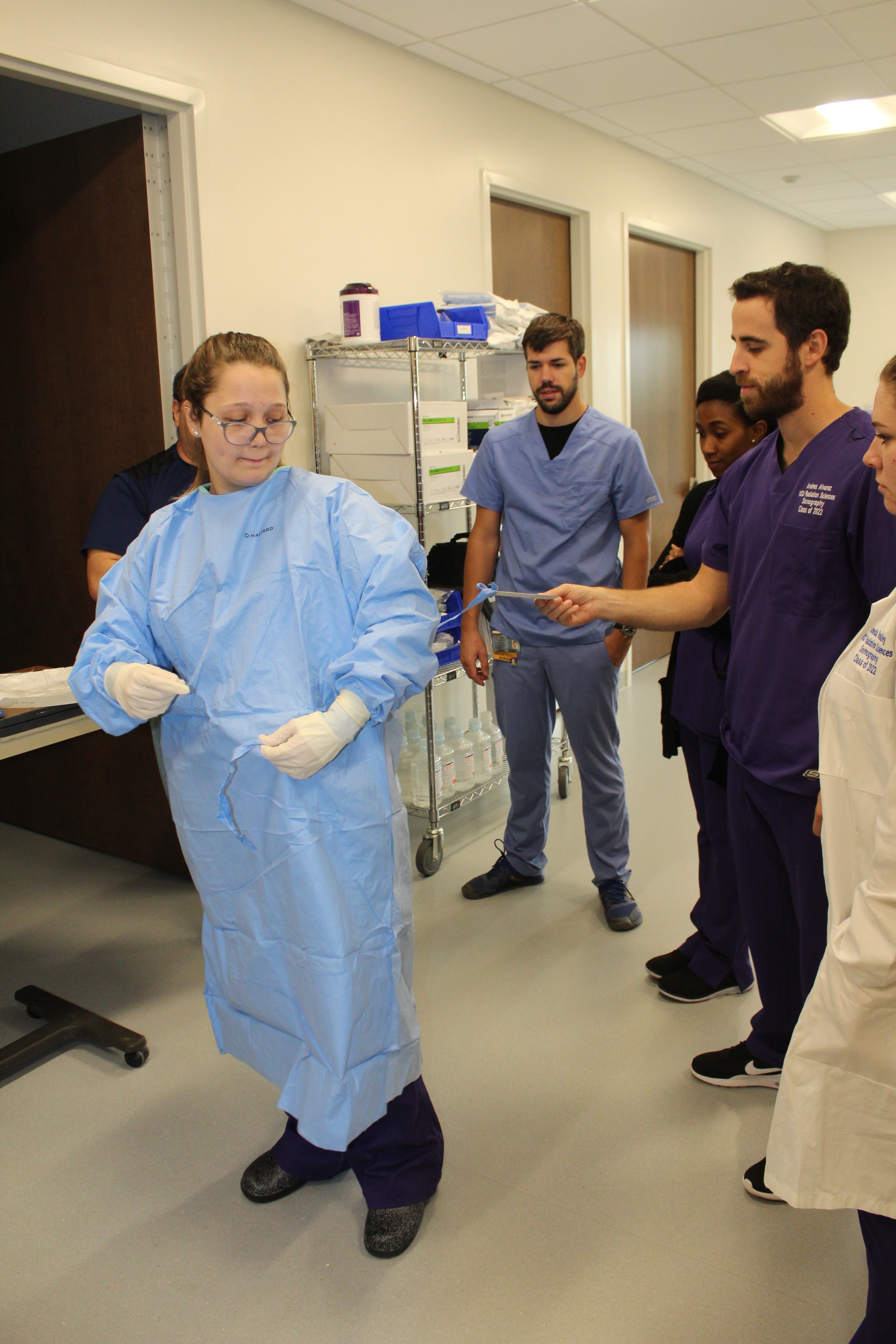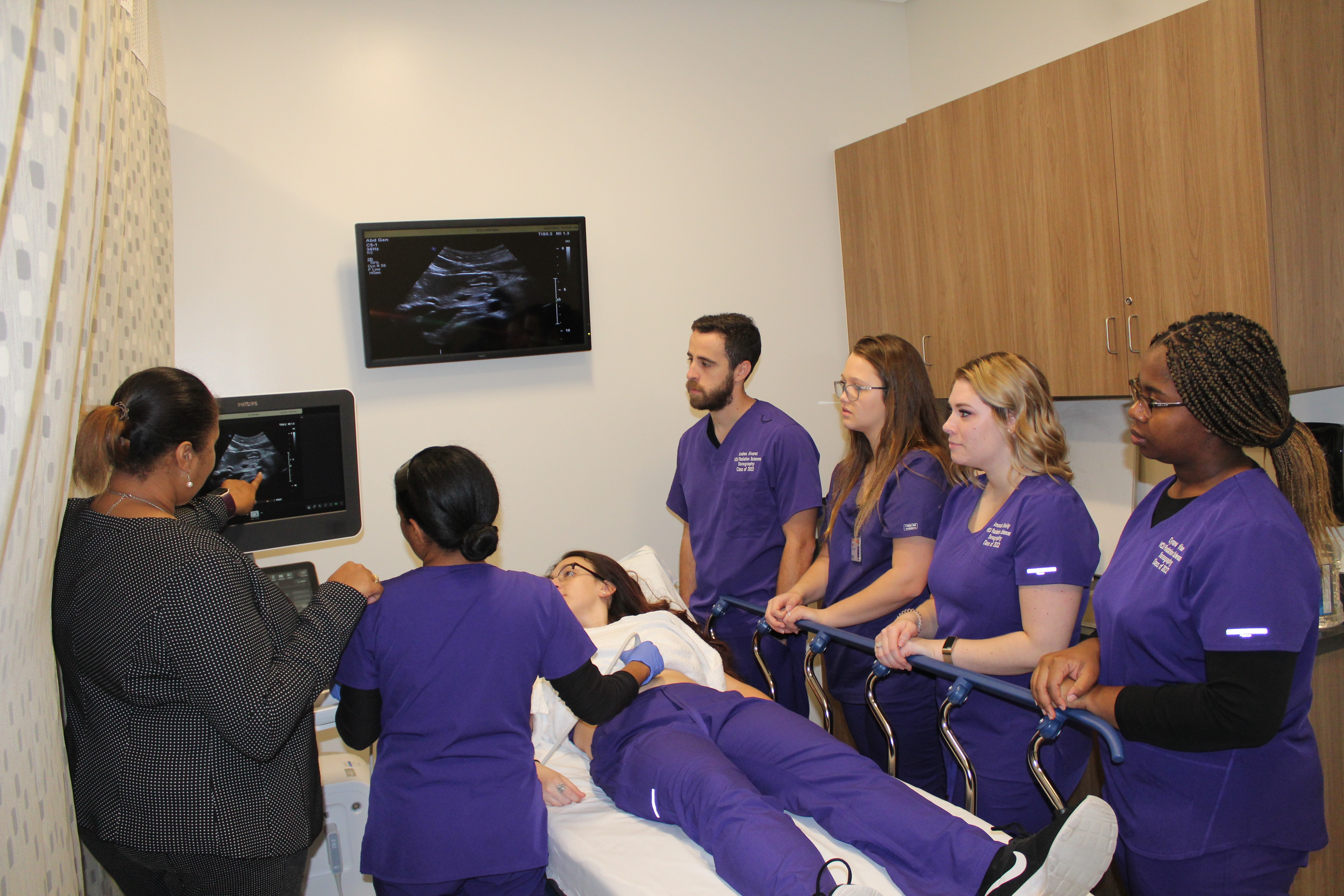Concentrations in Radiation Sciences
Radiation Sciences offers the following concentrations:
Clinical Radiation Sciences, Bachelor of Science with a concentration in Nuclear Medicine Technology
Nuclear medicine technology uses radioactive material for both diagnosis and therapy. Procedures consist of imaging studies, analysis of biologic specimens, and therapy. In imaging studies, patients are administered a radioactive material which localizes in a specific organ or system of the body.
The nuclear medicine technology program at Virginia Commonwealth University is accredited by the Joint Review Committee on Educational Programs in Nuclear Medicine Technology (JRCNMT), 820 W. Danforth Rd, #B1 / Edmond, OK 73003; phone 405-285-0546; mail@jrcnmt.org; www.jrcnmt.org. For more information, go to JRCNMT online directory of accredited programs and read the accreditation letter linked to the program’s directory listing (https://www.jrcnmt.org/find-a-program/).
Learn more about the nuclear medicine concentration, including how prospective students will know if nuclear medicine is a fit for them, and why they should choose VCU.
What is Nuclear Medicine?
Is Nuclear Medicine for you?
Why choose Nuclear Medicine at VCU?
Radiographers use radiation and other forms of energy to look inside the human body. This area of diagnostic medicine is called imaging technology or radiography. Diagnostic techniques include radiography (x-ray),computed tomography (CT), and magnetic resonance imaging (MRI).
Radiation therapy utilizes ionizing radiation in a strictly controlled environment to treat disease, primarily cancer. High energy x-rays, gamma rays, and electron beams are common forms of ionizing radiation used. Ionizing radiation can be administered using external beam therapy or by placing a radioactive material directly into a body tissue or cavity. The ultimate goal of radiation therapy is to destroy all abnormal cells while sparing the surrounding normal tissue as much as possible.
What is Diagnostic Medical Sonography?
Diagnostic Medical Sonography (DMS), frequently referred to as sonography or ultrasound, uses high frequency sound waves to produce images for diagnosis and treatment purposes. Unlike other department programs, sonography is a career field that does not use radiation. The skilled technologists, called sonographers, must use professional judgement, problem solving skills, and medical equipment/ultrasound technology to create, analyze and interpret images of internal structures of the body such as organs, tissues, fetuses, blood vessels and musculature.
VCU's DMS Program
 At the VCU Diagnostic Medical Sonography program, students will be immersed in a rich curriculum, a diverse student body, and develop rewarding skills through blended learning, classroom instruction, hands on laboratory experiences, and clinical education. Our goal is to prepare competent entry-level sonographers in the cognitive (knowledge), psychomotor (skills), and affective (behavior) learning domains for Abdominal Sonography – Extended and Obstetrics and Gynecology Sonography.
At the VCU Diagnostic Medical Sonography program, students will be immersed in a rich curriculum, a diverse student body, and develop rewarding skills through blended learning, classroom instruction, hands on laboratory experiences, and clinical education. Our goal is to prepare competent entry-level sonographers in the cognitive (knowledge), psychomotor (skills), and affective (behavior) learning domains for Abdominal Sonography – Extended and Obstetrics and Gynecology Sonography.
Students enter the department in the fall semester as a sophomore where they complete core courses. The student's Junior year begins the DMS phase of the program. Program features include:
- class sizes between 10-15 students ensuring personalized attention and instruction,
- clinical education in a variety of clinical settings (medical centers, regional hospitals, and outpatient facilities) across 30 medical affiliates. (Note: Some sites may be 1.5 hours from VCU's College of Health Professions).
- The opportunity for hands-on experience in a safe and supportive laboratory with advanced imaging equipment such as Philips EPIQ, Philips CX50, and Philips IU-22 ultrasound machines, a variety of imaging phantoms (e.g., pelvic, fetal, scrotal, neonatal hip, neonatal brain), a Trophon unit, and state-of- the-art artificial intelligence simulation trainer.
Becoming Certified
 After successful completion of the Ultrasound Physics and Instrumentation courses, students will be eligible to sit for the American Registry for Diagnostic Medical Sonography (ARDMS) SPI examination. In addition, 60 days prior to graduation, students will be eligible to sit for national certification examinations offered by the ARDMS (abdominal and obstetrics/gynecology).
After successful completion of the Ultrasound Physics and Instrumentation courses, students will be eligible to sit for the American Registry for Diagnostic Medical Sonography (ARDMS) SPI examination. In addition, 60 days prior to graduation, students will be eligible to sit for national certification examinations offered by the ARDMS (abdominal and obstetrics/gynecology).
Programmatic Accreditation
The Diagnostic Medical Sonography General Concentration Program is accredited by the Commission on Accreditation of Allied Health Education Programs (www.caahep.org) upon the recommendation of the Joint Review Committee on Education in Diagnostic Medical Sonography.
CAAHEP
9355 - 113th St. N, #7709
Seminole, FL 33775
727-210-2350
https://www.caahep.org/
JRCDMS
6021 University Boulevard, Suite 500,
Ellicott City, MD 21043
443-973-3251 phone | 866-738-3444 fax
jrcdms.org | mail@jrcdms.org
Resources
American Registry for Diagnostic Medical Sonography: www.ardms.org
American Registry of Radiologic Technologists: www.arrt.org
Commission on Accreditation of Allied Health Education Programs: www.caahep.org
Joint Review Committee on Education in Diagnostic Medical Sonography: www.jrcdms.org
Joint Review Committee on Education in Radiologic Technology: www.jrcert.org
The Second Modality BS programs are for certified radiographers who desire to continue their professional education and concentrate in either Diagnostic Medical Sonography, Nuclear Medicine Technology or Radiation Therapy. All programs are full-time.
The Department also offers a program for certified radiologic technologists to complete their bachelor's degree. The degree completion programs are available on a full- or part-time basis. To be eligible for admission to a completion program, the applicant must be certified (ARRT or NMTCB) in the appropriate discipline or eligible for certification.